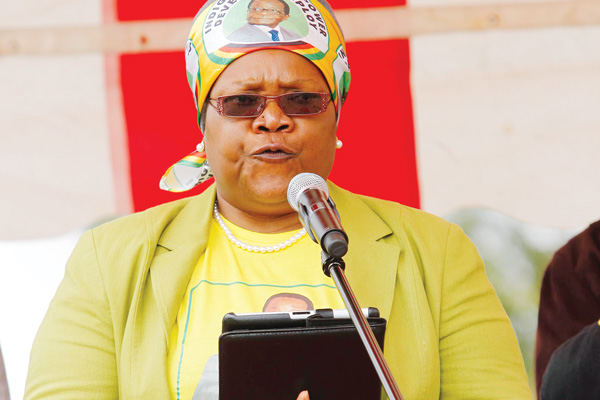
The lack of a clear succession plan for aged President Robert Mugabe has heightened the risk of political instability in Zimbabwe amid worsening Zanu PF factional power struggles ahead of the polls next year, a leading global defence, intelligence and security analysis firm has warned.
BY Everson Mushava
In a country-focused report entitled Factional politics threaten Zimbabwe’s stability released on January 18, the London-based IHS Jane said the outlook for state stability in Zimbabwe remained bleak as Mugabe campaigned for a further term in 2018 despite his advanced age.
Among key findings, IHS Jane researchers Sabine Machenheimer and Sumaiya Aboo said there was a high risk of insecurity and government instability in the event of Mugabe being re-elected in 2018 but failing to complete his term due to incapacitation or death in office.
Machenheimer and Aboo concluded that the emergence of former vice-president Joice Mujuru’s Zimbabwe People First (ZimPF) may complicate Mugabe’s succession.
“Previous defections of Zanu PF members have had only a limited impact on the party’s electoral performance, but the purging of Mujuru and subsequent formation of the ZimPF are likely to pose a greater threat to the governing camp, particularly as avenues for co-operation are discussed among opposition parties ahead of the 2018 election,” their report says in part.
Among other factors, the researchers said they considered that Mugabe —who has ruled Zimbabwe since independence in 1980 — would be aged 94 if he contested for office in 2018.
The report said incapacitation of the president would be potentially destabilising as it could inflame the already intense succession-related fights between Zanu PF factions, allegedly led by first Vice-President Emmerson Mnangagwa and the G-40 group that reportedly includes first lady Grace Mugabe, ministers Jonathan Moyo, Saviour Kasukuwere and Patrick Zhuwawo, among other cabinet ministers.
- Chamisa under fire over US$120K donation
- Mavhunga puts DeMbare into Chibuku quarterfinals
- Pension funds bet on Cabora Bassa oilfields
- Councils defy govt fire tender directive
Keep Reading
“Mugabe will be 94 in 2018… but despite obvious concerns about his candidacy at that age, if a succession plan is not finalised before then it is probable that Mugabe will indeed be the candidate,” reads part of the report.
“Zanu PF’s next elective congress is due in 2019, but an extraordinary congress would be needed if a presidential vacancy arose.
“In the interim, an open-ended succession would ensure ongoing internal battles, particularly between the factions aligned to Mnangagwa and the G40, respectively.
“Political power plays would aggravate policy instability (eg. around economic proposals aimed at international re-engagement) and divisions within key party constituencies, including the military and security forces and the war veterans.
“Possible infighting over transition procedures, if the executive falls vacant, would also raise the already high risk of government instability,” the report said.
On the second scenario, the report said there was a “moderate” possibility of an opposition victory on the back of “significant popular and socio-economic discontent.”
According to the report, the opposition could win, but only if it contested as a grand coalition, although it could still be prevented from taking power by the security forces.
“The likelihood of this scenario would rise if a grand opposition coalition were to be announced, including in the event of a second-round [elections] run-off, although agreement on leadership and presidential candidacy are likely to remain among the key sticking points ahead of the poll,” the researchers added.
“However, Zanu PF is unlikely to be caught off-guard by a possible opposition victory in 2018, as it seemingly was in 2008.
“Concerns of an opposition victory would also further raise the risk of pre-poll violence and intimidation of opposition leaders and supporters.
“An outright MDC-T victory would increase the risk of military intervention as a number of officials from the defence and security forces have previously stated that they would not accept a leader without credentials from the war of independence.”
However, the risk of military resistance to an opposition take-over would be lowered in the event of an opposition alliance victory between ZimPF president Mujuru and MDC-T, as Mujuru “probably still counted” on support from within the defence and security structures.
In the third scenario, the researchers said there was a “moderate” risk that Zanu PF would split if Mugabe failed to consolidate support around one successor.
“If the [2018] election results were to be contested by either the rival Zanu PF factions or the opposition parties, this would pose a severe risk of violent unrest,” the report says.
“Most rival factions and opposition parties would likely secure some support from groups of loyalists within either the military, or the police.
“With the security forces therefore likely to be split and engaged in unrest, death and injury risks would be significant.”
The report warned of the possibility of diplomatic and military intervention from the Southern Africa Development Community, leading to the formation of a government of national unity if the unrest was protracted, or triggered an influx of Zimbabwean refugees into its neighbours.
But the possibility of a unity government would be drastically diminished if the MDC-T, which was reduced to a junior partner in the unity government between 2009 and 2013, won the 2018 elections.











